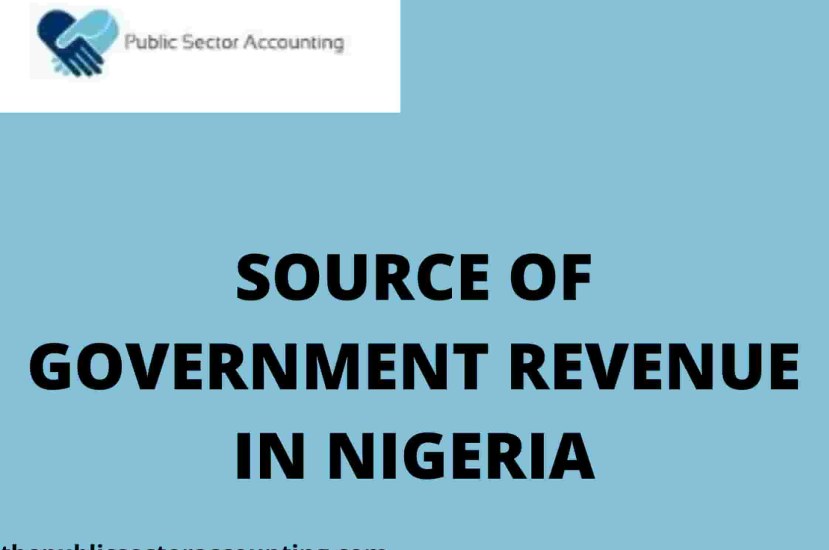Revenue Sources for the Nigerian Government, it is the responsibility of the government to provide basic services to the population, such as law and order, road and port construction, schools and hospitals, and a plethora of other activities required for a modern society.
Summary of Contents
Source of Government Revenue in Nigeria
However, in order to provide these services, the government must be able to fund them by ensuring that there is a sufficient flow of money into its hands to enable it to pay for the work it must do.
As a result, the government’s operations must rely on having an adequate financial system, which, when properly managed, will provide the necessary resources and enable them to be used in the national interest.
SOURCE OF GOVERNMENT REVENUE IN NIGERIA PDF
Download source of government revenue in Nigeria PDF here
The central government’s financial structure has become increasingly sophisticated during the last few decades.
Not only has the quantity of money moving in and out of the public treasury each year increased dramatically, but it also comes from a far wider range of sources and is used for a much wider range of purposes.
Find Out Also: SOURCE OF CONSOLIDATED REVENUE FUND IN NIGERIA
Revenue is the government’s normal income, and it is made up of taxation (which accounts for the majority of revenue) and earnings (charges raised by government departments for services
rendered rents obtained for the leasing of government properties or buildings, income earned on government investments, and so on).
NIGERIAN GOVERNMENT REVENUE SOURCES
This is the amount of money coming in to finance spending. This pattern repeats itself year after year.
Its magnitude, on the other hand, might vary from year to year, depending on whether the government decides to increase or decrease taxation or earnings, or if the economy develops naturally (for example, if everyone in Nigeria receives more income, the share of the tax
Find Out Also: WHAT IS CONSOLIDATED REVENUE FUND IN NIGERIA
collector will also automatically rise).
Revenue
A rise in net value as a result of a transaction is referred to as revenue. There are four main revenue streams. Property income obtained from asset ownership, sales of products and services,
and voluntary transfers received from other units are all examples of coercive transfers imposed by government units.
Revenue from taxes
Compulsory transfers to the government sector make up the majority of tax revenue for many government units.
Certain mandatory transfers are exempt from taxation, such as fines, penalties, and the majority of social security contributions.
Refunds and corrections of incorrectly collected tax income appear to be transactions that reduce the government unit applying the tax’s net worth.
They are, more precisely, modifications that allow the previously reported excessive growth in net worth to be corrected. As a result, these trades are classified as losses.
On non-tax revenue, all other types of revenue are typically merged into a heterogeneous category.
Grants are non-obligatory payments made to government agencies or foreign organizations.
Grants to international organizations from foreign governments would be recorded in the consolidated fund accounts.
Grants can be capital or current in nature, and they can be received in cash or in kind.
Market establishment sales, administrative fees, incidental sales by non-market establishments, and imputed sales of goods and services are all examples of sales of products and services.
Some administrative fees are so exorbitant that they plainly outweigh the cost of the services offered.
Taxes are applied to such fees. Sales of products and services are recorded as income before any expenses involved in generating that revenue are deducted.
It’s entirely possible for government agencies to sell their products for less than their cost of manufacture.
In fact, because they are non-market manufacturers, most government agencies distribute their products for free or at low prices.
In these circumstances, the unit’s net value has fallen as a result of higher production costs than revenue from sales of goods and services.
TAXATION REVENUE
Direct taxation:
Individuals and corporations pay direct taxes such as income tax, corporate tax, and duty. It also includes VAT and Capital Gains Tax.
Taxes levied in an indirect manner
This is a tax that the person who suffers or bears the burden does not pay directly. Individually purchased and consumed goods and services are subject to this type of tax.
Taxes on general products and services, excises, customs and other imports, export taxes, and levies are among them.
Non-tax revenue encompasses all sources of income other than taxes. Grants, loans, royalties, product and service sales, and so on are examples.
Grants are non-obligatory funds received by governments or government entities from international organizations and other developed countries such as the United Kingdom, the United States, China, and France, among others.
The following items are classified as constituting tax income in the consolidated fund accounts:
(a)Taxes levied directly (Direct Tax)
Pay-As-You-Earn (PAYE) is deducted from the salary of the following individuals:
- Armed Forces.
- Armed Forces.
- Police Force of Nigeria.
- Officers of the Ministry of External Affairs.
- Abuja residents of the Federal Capital Territory.
- High Commissions and Embassies of States.
(c) License and Internal Revenue:
These are revenue items earned from the licensing of intellectual property.
The items are as follows:
- Licence fees for the sale of firearms.
- Fees for Goldsmith Licences.
- Licensing fees for gold traders.
- Registration fees for businesses.
- Licence fees for radio and television.
- Fees for obtaining a citizenship license.
- Fees for residence permits.
(d) Exploration Fees for mining.
- Royalty plated with gold.
- On tin and iron ore, royalty.
- Bitumen and coal royalties
- On limestone and other mineral resources, a royalty is charged.
- E) fees
- Court fees.
- Fees for probate.
- Medical fees
- Court-imposed fines.
(f) Profitability and Sales
- Interest and dividends received by the federal government on its investments.
- Sales of property owned by the federal government, such as land, vehicles, and buildings.
- Publication and stamp sales.
- Fee for postal and money orders.
(h) Federal Government Property Rental
- Rental of government-owned buildings and parks.
- government of public land and buildings The national stadium, Tafawa Balewa Square, the Trade
Fair Complex, and the National Theatre are among examples.
- Rental of government-owned property such as machinery and trucks, among others.
(h) Interest and Repayments (General): These are revenue items generated by interest and
repayments on loans made to employees in the form of advances, as well as to companies and
government-owned facilities.
(I) Interest and Repayments (State Governments): – These are revenue streams generated by
interest and repayments on loans extended to Federation State Governments.
(j) Reimbursements: These are reimbursements provided to the Federal Government by States,
Local Governments, and parastatals for expenses incurred on their behalf by the Federal
Government.
(k) Armed Forces Property Sales: These are revenue items earned from Armed Forces
property sales.
They include the following: –
- Vehicles and buildings for the Armed Forces are rented.
- Earnings from Armed Forces bands.
- Payment of school fees to Armed Forces institutions such as the Nigeria Defense Academy, the
Nigeria Navy Secondary Schools, the Nigeria Air force Secondary Schools, and Command Day
Secondary Schools.
(l) Other revenue items:
These include the following:
- Repatriation of looted funds
- Recoverable from armed robbers, drug pushers, and con artists, among others.
- Reimbursement of overpayments.
INTERNATIONAL TRADE AND TRANSACTIONS
IMPORT DUTIES
- General import duties
- VAT on imports
- Penalties on import duties
- Others (non-tax revenue)
- EXPORT DUTIES ON
- Cocoa
- Timber
- Diamond
- Kola Nuts
- Re-Export Levy
- Other export duties
- DOMESTIC TAXES ON GOODS AND SERVICES
- Beer
- Cigarettes
- Spirits
- Mineral water
VALUE ADDED TAX ON
- Beer
- Cigarettes
- Spirits
- Mineral waters
- Textiles (Fabric)
- Textile (Apparels)
- Soap
- Cosmetics
- Furniture
- Salt
- Radio & TV/Elect. Prod
- Rubber products
- metal products
- plasticware
- glassware
- aluminium ware
- roofing sheet
- paints
- food items
- nonalcoholic Beverage
- paper production/printing
- sawn timber
- flour
- chemical
- cement
- other local industries
- professional services
- electricity
- water
- telecommunication
- quarrying
- sand winning
- hotels & restaurant
- entertainment
- advertisement
- miscellaneous
PETROLEUM TAXES ON
- Premium
- Kerosene
- Gas oil
- Amortization free-LPG
- Promotional Levy-LPG
- Jet Fuel (ATK)
- Industrial diesel oil
- Unified gasoline
- Bunkers
- Petroleum road fund
- Petroleum exploration Levy
- Petroleum strategic stock Levy
- Petroleum energy fund
TAXES ON INCOME, PROFIT AND CAPITAL GAINS
- Personal (Employee)
- Self-employed
- State enterprises
- Capital gains tax
- Gift tax
- Rent tax
- Mineral royalties
- Service tax
- Stamp tax
- Banderoles tax
- Penalties
- Dividend tax
- Interest
- Commission
- Management and tech. ser.
- Ceded misc. Tax
- Property rate
- Non-tax Revenue
Conclusion
The financial structure of the Nigerian government has become increasingly sophisticated during
the last few decades. Taxation (which accounts for the majority of revenue) and earnings make
up the central government’s revenue.
Taxes, property income, product and service sales, and voluntary transfers are the four main
revenue streams. Before any expenses associated with earning that money are subtracted, sales of
items and services are recorded as income. Examples include grants, loans, royalties, product and
service sales, and so on.
Because they are not market producers, government organizations can sell their products for less
than their cost of production.
Fees for the sale of firearms and business registration, among other things. Interest and
repayments on advances given to employees, as well as businesses and government-owned
facilities, Repatriation of looted funds and fines imposed on criminals and con artists are two
other sources of revenue.






Leave a comment